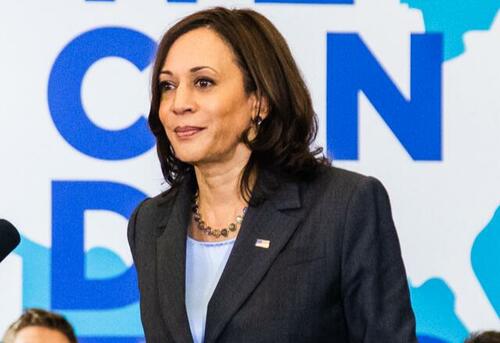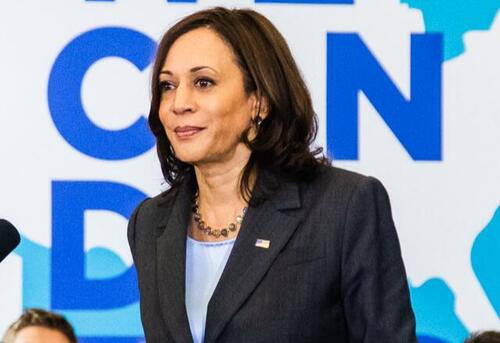
Kamaflage: The Harris Policy Dump
Authored by Richard Porter via RealClearPolitics,
The Harris-Walz campaign has been vibe-a-licious and content-free; its positions on domestic and foreign policy have (with apologies to Hollywood) essentially consisted of open defiance of any presidential campaign norms: “Policy? We ain’t got no policy. We don’t need no policy. We don’t have to show you any stinkin’ policy.”

But the campaign’s policy on policy changed, sort of, the day before the debate, when it went ahead and posted some stinkin’ policy anyway.
In a word, Harris’ policy dump should be seen for what it is: Kamaflage. She uses words that score well with Republicans and moderates, but inverts the meaning of those words, creating an unintelligible stinkin’ mess.
“Kamala Harris will create an Opportunity Economy where everyone has a chance to compete and a chance to succeed – whether they live in a rural area, small town, or big city.” Really? How is she going to do that?
The campaign also promises that Harris would “make it a top priority to bring down costs and increase economic security for all Americans.” It added, “As President, she will fight to cut taxes for more than 100 million working and middle class Americans while lowering the costs of every day needs like health care, housing and groceries.”
How would Harris cut taxes? Not by actually reducing anyone’s taxes, but by increasing spending: “restoring” (i.e. increasing) the amount paid out under two tax credits that provide cash payments to lower income families, most of whom already do not pay federal income taxes. But, as we learned from the ironically named Inflation Reduction Act, pumping more money into the system without increasing the supply of goods and services just devalues the dollar and creates inflation for everyone.
Harris’ campaign calls for both “making our tax system fairer and prioritizing investment and innovation,” while also calling for higher taxes on corporate earnings, quadrupling the tax on corporate distributions through stock buybacks, and increasing the capital gains rate by 40%. With a flourish that would make George Orwell blush, she blithely asserts that tax increases bolster the economy too: “When the government encourages investment, it leads to broad-based economic growth and creates jobs, which makes our economy stronger.” In what alternate reality does raising taxes on investments encourage investments?
A lifelong government employee who never worked in the private sector, Harris apparently envisions herself a preternaturally talented real estate developer. Her campaign’s policy paper claims she has a “comprehensive plan” to build three million more rental units and affordable homes “to end the national housing supply crisis in her first term.” What’s the big plan? She’ll “cut red tape” to build housing faster, while also penalizing companies that “hoard available homes to drive up prices,” and “outlaw new forms of price fixing by corporate landlords.”
Did you follow that? She will cut red tape and build more housing by imposing new red tape in the form of federal rent regulations so that landlords make less money. This is merely contradictory nonsense with poll-tested verbiage.
She would also give $25,000 to first-time home buyers, “with even more generous support for first-generation homeowners.” Obviously, giving people more money to buy houses means houses will cost more, not less. Note, too, that not all first-time home buyers would be treated equally. Some, such as immigrants (whether here legally or illegally), would get even more than young Americans who are descended from (gasp!) previous homeowners.
Harris also wants you to know that “neighborhood shops, high-tech startups, small manufacturers, and more – are the engines of our economy.”
“Kamala Harris will always support small businesses and invest in entrepreneurs as president,” the campaign vows in employing good Republican words! How will she do this? By expanding set-asides for minority-owned small businesses. She has set a goal of 25 million new business applications (apparently you’ll have to apply to start a small business under Kamala Harris) and would expand the start-up expense deduction, while driving venture capital to the talent that exists all across our country, including in rural areas. Does this portend new geographic investment regulations for venture capital? Note too, that she asserts she will drive this investment at the same time as increasing the tax on investments.
She also calls for the first-ever price regulations for grocery and food businesses, claiming that price gouging is rampant in an industry where the profit margins are usually around 1.5%. She also calls for extending price regulations with respect to health care and prescription drugs. Of course, it’s axiomatic that price regulations reduce supply – so what would happen in the real world is that there would be less food, drugs, and healthcare services, and what’s still produced will cost more too.
The Orwellian theme of using Republican words to Kamaflage socialist policies while asserting that down is up continues throughout the entire package of policies: Secure the borders by hiring more agents to process more immigrants! Reduce crime by making lawful gun ownership harder! Stand up for Israel’s right to defend itself, except with respect to Palestinian terrorists! Protect voting by blocking states from taking steps to secure the vote, like imposing ID requirements!
You get the gist. Her policy dump is an incoherent mess put out under the thin guise of poll-tested verbiage in the hope of Kamaflaging the reality that a Harris administration would double down on the dumbest ideas of Sen. Bernie Sanders and the socialist “squad” in the House. The only thing clear from her policy proposals is that Kamala Harris has not changed. She’s only hiding her hard-left values behind verbiage she’s expropriating from her opponents.
Richard Porter is a lawyer in Chicago and a former policy advisor to President George H.W. Bush and Vice President Dan Quayle.
Tyler Durden
Thu, 09/12/2024 – 10:00

 1 rok temu
1 rok temu










![Nowa ustawa o opiece ma mylący tytuł. Nie przewiduje żadnych nowych świadczeń dla opiekunów albo osób niepełnosprawnych, seniorów, osób samotnych [projekt]](https://g.infor.pl/p/_files/38661000/paragraf-38661468.jpg)